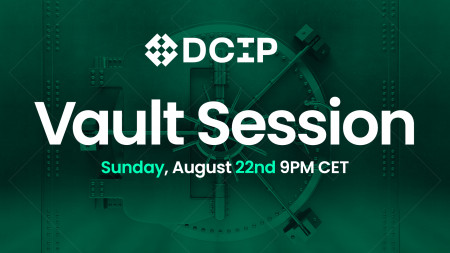DCIP Launches the First IaaS and Fully Decentralized Investment Fund Token on the Binance Smart Chain

EINDHOVEN, Netherlands, August 20, 2021 (Newswire.com) - DCIP (Decentralized Community Investment Protocol) has announced the release of the first part of its decentralized application. DCIP is the first investment as a service (IaaS) and fully decentralized investment fund token on the BEP20 Binance Smart Chain network.
Blockchains are a specific type of database that stores data in blocks and then chains the data together. The data is collectively controlled by the users and entries are irreversible. Many different types of information can be stored on a blockchain, but the most common use has been as a ledger of transactions, such as Bitcoin, which uses the technology in a decentralized, immutable blockchain. Blockchains can be incredibly useful in banking and finance as well.
On April 6, 2021, Forbes reported that the cryptocurrency market had topped $2 trillion in value. It was a huge moment for crypto, and Forbes cited BNB (Binance coin) specifically as one of the main factors driving that growth. The Binance platform is one of the most popular platforms due to its low fees (some of the lowest in the industry), a large selection of transaction types, comprehensive charting options, and a large number of supported currencies.
Unlike competitor tokens on Binance Smart Chain, DCIP is unique because it holds real-world use cases. DCIP has set out to turn investing on its head and invest as a community. Token holders have complete influence over the investments DCIP will make. The rewards from those investments will be distributed among token holders. The community investment wallet will invest the funds allocated to the wallet into new projects, NFTs, or anything the community decides to invest in. Its wallet will have a real-time audit on the dashboard.
DCIP has established community voting for decentralized investment decisions and features a fully decentralized voting option in its smart contract, conceptualizing the idea of decentralized investments. Investments on the platform are fully decided by token holders, verified and saved within its smart contract.
Built-in voting in the smart contract ensures that all decisions regarding what DCIP is invested in are community-led decisions. The decentralized voting platform creates transparency, a top priority for DCIP. Voting power is based on holdings. The more tokens held, the large the voting power.
In addition, DCIP's investment horizon is not limited to cryptocurrency investments and offers the option for real-world investments. The community could choose to invest in real estate, for example. An individual's DCIP token balance directly represents their share of the voting power and cut of the profits or rewards from investments paid in either BNB or BUSD, which acts as passive income for token holders.
The company plans to experiment with the voting frequency in the beginning. Voting will start with voting held every two days. The frequency will then be adjusted according to community feedback.
DCIP also features punishment taxes that reward HODLing, applying a 7% tax on sales made within 24 hours of holding. Furthermore, an additional feature is the inbuilt anti-whale policy in the smart contract, setting a maximum transaction amount capped at 0.1% of the total supply. These two features offer strengthened safety nets compared to other cryptocurrency tokens. Coins must be held for at least 24 hours to benefit from redistribution.
The initial supply of DCIP is 1,000,000,000,000,000 on-chain BEP20. Fifty percent of those tokens were burned at launch. Development and marketing were allocated 5.5% of the tokens, and 44.5% will be offered at the presale and private sale.
The total running supply of DCIP is 445,000,000,000,000 tokens. Forty-two percent of the running supply will be offered in a private sale, 38% will be offered in presales, and 20% will go to PancakeSwap. Tokens in the private sale are subject to token lock for five months. Each month, 20% of the tokens will unlock.
In order to ensure that $DCIP can be exchanged on PancakeSwap, each transaction will have a percentage that directly flows back to the liquidity on PancakeSwap. On each transaction, a percentage of that transaction will be burned. That decreases the total token supply, making the tokens more scarce.
DCIP has a standard 10% standard tax. Three percent of the tax goes toward liquidity, 1% goes into the marketing wallet, 2% goes to the community investment wallet, 2% is burned, and 2% is redistributed to holders who have held for longer than 24 hours. There is a 7% punishment tax for swaps made within 24 hours. Four percent of the tax goes into the community investment wallet, 1% is burned, and 2% is redistributed to holders who have held longer than 24 hours.
The main goal of DCIP is to give investing power back to ordinary individuals by decentralizing investments and removing the need for predatory hedge funds, investment bankers, and the like.
The CEO and founder of DCIP, Mike van Rijsingen, has specialized in cryptocurrencies since 2013.
"With the continuous evolvement of blockchain products, new opportunities will pop up for our platform; our investments are not bound to any chain, only the redistribution of the profit is bound to the BEP20 chain," said van Rijsingen. "Our goal is to take over traditional investments as we know them today, with no need for expensive hedge funds, investment bankers, or wealth managers. With DCIP, we will bring the power back to the people."
DCIP will conduct its first-ever livestream talk show on August the 22nd and can be watched on twitch.tv/dcip_finance Guests and partners are invited to talk about the project. The Livestream will be held in a discontinued gold vault of the Royal Dutch Bank.
For more information about DCIP, to buy now and to download their white paper, visit dcip.finance.
Media Contact Details:
Company: DCIP.finance
Contact name: Mike van Rijsingen
Email: mike@dcip.finance
Source: DCIP.finance
